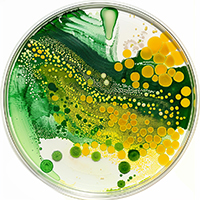Scientific Posters
Zymo Research's scientific posters highlight the latest breakthroughs in molecular biology, showcasing innovations spanning from epigenetics to microbiomics. We are proud to present insights from our collaborations with leading scientists and institutions worldwide, with more contributions to the field of life science on the horizon.
Featured Poster

An Integrated Approach for Pathogen Detection, AMR Monitoring, and Functional Analysis in Wastewater
X. Cheng , J. Wilkinson, K. Ngo , P. Baybayan, Y. Kim, P. Pham, E. Carrasco, S. Tang, J. Shen, and K. LockenWastewater surveillance has emerged as a pivotal tool in public health epidemiology. Particularly catalyzed by the Covid-19 pandemic, modern culture-independent sequencing methods have become indispensable due to their ability to offer a comprehensive perspective.
View PosterRead-Level Methylation Pattern Extraction for High-Multiplex Large-Scale Targeted NGS Assay
Mingda Jin, Masatomo Kaneko, Steven Cen, Hongtao Li, Wei Guo, Xinyi Zhou, Atsuko Fujihara, Tsuyoshi Iwata, Lorenzo Storino Ramacciotti, Divyangi Paralkar, Giovanni E Cacciamani, Manju Aron, Osamu Ukimura, Inderbir S. Gill, Gangning Liang, Andre L. Abreu, Jeffrey Bhasin, Xiaojing Yang, Xi-Yu JiaThe abnormal changes in DNA methylation are linked to the early stages of carcinogenesis. Identifying these epigenetic changes in circulating tumor DNA (ctDNA) can reveal potential biomarkers for the early diagnosis of various cancers. However, analyzing such data poses bioinformatics challenges due to the lack of sensitivity in detecting the low abundance ctDNA signals in biopsy samples, which are often overwhelmed by the complexity of libraries containing hundreds of targeted regions. Read-level methylation analysis holds the promise of more in-depth DNA methylation detection due to the wide coverage and high sensitivity of rare signals. However, this approach is hindered by the absence of a standardized workflow capable of generating interpretable reports suitable for both bench scientists and professional bioinformaticians. Here, we present a bioinformatics workflow that examines next-generation sequencing (NGS) data and characterizes the read-level methylation patterns of amplicons. Compared to other currently available tools, our method is designed to work with highmultiplex, large-scale targeted assays. It effectively eliminates the undesired noise derived from sequencing byproducts such as false CpG calls, dimers, and off-target alignments. Additionally, to accommodate the substantial volume of data generated by state-of-the-art NGS platforms, the workflow enables parallel processing of samples compatible with both cloud-based and on-premises computing resources. This workflow provides a comprehensive per-sample visualization of DNA methylation patterns and reports read-level methylation results in a “pattern-as-a-feature” table. In this table, the occurrence of an amplicon epiallelic haplotype (pattern) for every sample is represented as a “feature column” and is aggregated with all patterns discovered in the experiment. These read-level patterns, along with other information, can be used to develop machine learning algorithms to reiteratively harvest true
View PosterTake the Lab to the Field With a Portable Sample Processor and DNA Stabilization Reagent
Nikolas M. Isely, Steven Wong, Marc E. Van Eden, and Xi Yu JiaWith the increased focus of research on the effects of global climate change, natural disasters, and anthropogenic perturbations on the environment it is becoming more important to collect and process samples for molecular analysis in remote locations. Working in the field presents several challenges including sample processing and nucleic acid stabilization. Historically it has been necessary to transport bulky and expensive equipment into the field to process and preserve samples. To tackle these challenges Zymo Research has developed a hand-held, portable bead beating device, the Xpedition™ Sample Processor (XSP). When the XSP is used in conjunction with the specially developed Xpedition™ Lysis and Stabilization Solution, DNA is preserved in complex and harsh lysates without the need for refrigeration for greater than 7 months. DNA isolated from fungus, soil, plants, and animal tissue using the Xpedition™ Environmental Kits is ideal for use in modern molecular analysis techniques like qPCR, metagenomic analysis, and DNA barcoding. Here we present data showing the preservation and stabilization of DNA at room temperature for extended periods of time in complex lysates.
View PosterUniversal rRNA Depletion for Transcriptome Analysis of Any Organism with a Streamlined, Autolaunch Bioinformatics Platform
Yi Xu, Kate V. Kuntz, Jeffrey M. Piña, Zhenfeng LiuDepletion of ribosomal RNA (rRNA) is commonly adopted in total RNA-seq experiments to maximize the sequencing efficiency given its overabundance in RNA samples.1 Most existing rRNA depletion strategies are probe-based and well-established for human samples and mouse/rat models. Research utilizing other models and non-model organisms often lacks a simple and reliable rRNA depletion solution. To address such a need, Zymo Research developed a novel probe-free rRNA depletion strategy, RiboFree Universal Depletion, which is integrated into a simplified library prep procedure to enable stranded, total RNA library preparation for any organism. Furthermore, Zymo Research deposited an RNA-Seq data analysis pipeline to a no-code platform called Aladdin (www.aladdin101.org) for researchers to complete essential bioinformatic analyses including differential gene expression and gene set enrichment analyses in a streamlined, point-and-click manner. The RiboFree technology and the Aladdin bioinformatics platform will greatly empower researchers from diverse backgrounds to make further impactful contributions.
View PosterUrine Preservation and Stabilization and its application in Microbial Urinalysis
Michiko Suwoto, John Sherman, Eric Kircher, Shuiquan Tang, Ryan Kemp, Yap Ching Chew, Xi Yu JiaUrine is an ideal sample input for many applications because of its easy and non-invasive collection procedure. However, nucleic acid detection in urine can lack sensitivity and be problematic due to nucleic acid instability and bacterial contamination in the sample. In addition, biased microbial lysis in urine hinders accurate sample analysis. To address these problems, we developed improved urine collection and purification procedures for molecular and microbial testing, from sample collection to sample analysis. In this study, a stool sample was spiked into a urine sample to simulate stool contamination in urine. Next, Urine Conditioning Buffer™ (UCB™), a uniquely formulated nucleic acid preservation and stabilization reagent, was added to the urine sample. To analyze the stability of the nucleic acids in the sample, urine was stored at room temperature at different time intervals: 0 days, 2 weeks, and 1 month. At each timepoint, DNA was extracted using the ZymoBIOMICS® DNA Miniprep Kit, which includes an efficient lysis system which enables unbiased lysis of microbes. The microbial composition of the DNA was then profiled via 16S rRNA gene targeted sequencing. The results of the 16S rRNA gene targeted sequencing analysis showed that the bacterial profile composition of UCB™- preserved urine remained consistent throughout the different time intervals (0 days, 2 weeks, and 1 month), indicating that there was no bacterial blooms or nucleic acid degradation. In this analysis, we also showed that DNA from both gram-positive and gram-negative bacteria were successfully extracted using the ZymoBIOMICS® DNA Miniprep Kit. These findings demonstrated that UCB™ can be reliably used as a preservative for urine samples collected for microbiome profiling because it inhibits microbial growth and preserves the DNA in the urine sample at room temperature over a month period. Furthermore, UCB™ was designed to concentrate the sample, making the large unwieldly urine volumes more manageable (e.g. 40 ml is concentrated to < 200 µl) without leading to microbial profiling bias. Finally, UCB™ uses precipitation to separate out the DNA fraction, which avoids relying entirely on centrifugation for separation and leads to the recovery of DNA that is typically lost in supernatant removal. Here, we presented an improved urine collection procedure to stabilize nucleic acids in urine samples, coupled to an unbiased microbial urinalysis.
View PosterStandardizing Microbiomics: Removing Bias and Errors in Collection, Purification, and Analyses
Ryan Kemp, Shuiquan Tang, Elinne Becket, Larry Jia, Marc Van Eden, Standa Forman, Eric Kircher, John Sherman, Luigi Basillio, Michelle Thai, Steven Wong, and Mikayla MagerMicrobial composition profiling techniques powered by Next-Generation sequencing (NGS) are becoming routine studies. However, it is well known that results are prone to bias and errors in every step of the workflow, including sample collection, DNA /RNA extraction, library preparation, sequencing and bioinformatics analysis. Therefore, standardization of these NGS workflows is necessary to minimize bias and improve data quality and reproducibility in microbiomics studies. The figure on the right shows challenges associated with each step. At Zymo Research, we have constructed a comprehensive product line, coined ZymoBIOMICS®, designed for unbiased, accurate microbiomics and metagenomics analyses and validated using the ZymoBIOMICS® Microbial Community/DNA Standards
View Poster
